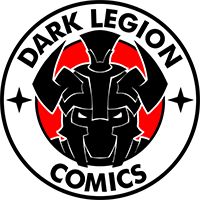Hammer Films: The Decline
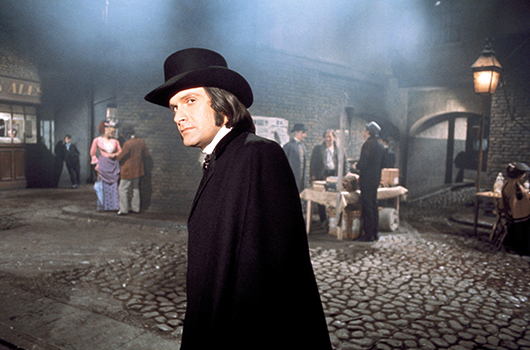
The memory of Ralph Bates is in an unfortunate position.
The son of two Psychiatrists he had a unique approach to the craft of drama being able to concentrate on the deeper drives of characters and more importantly those of the characters he was playing against. He had enough raw talent to land a scholarship to the Yale Drama School. When he returned to Britain he went into the more or less standardized path of an apprentice British actor, touring small venues around the country, trading off roles nightly with his friends and learning how to play different parts, and racking up the required hours. Once he had his Equity card he was immediately snapped up by the BBC for various roles. One of the real gold nuggets he picked up was the part of Caligula for the BBC’s The Caesars.
That opened the door to films for him and that’s where things took an unfortunate turn for Ralph Bates’ career. He became the face of Hammer Films’ declining years.
This wasn’t remotely his fault, the company was very dependent on its franchises and it only had three of them. Quatermass, (which never sold well in America), Frankenstein, and Dracula, which both sold well in the States but were rapidly running out of gas. They had all started life in the Fifties and it was now the Seventies, a world so night and day different it felt like another century rather than another decade.
The formula that had worked so well for Hammer in the past was starting to feel out of date. The thing is Hammer knew they had a problem and Ralph Bates was supposed to be a big part of their solution. This was Hammer engaged in a dedicated effort to remake itself into something relevant with the Baby Boomers. It worked about as well as you think it did.
Taste the Blood of Dracula (1970)
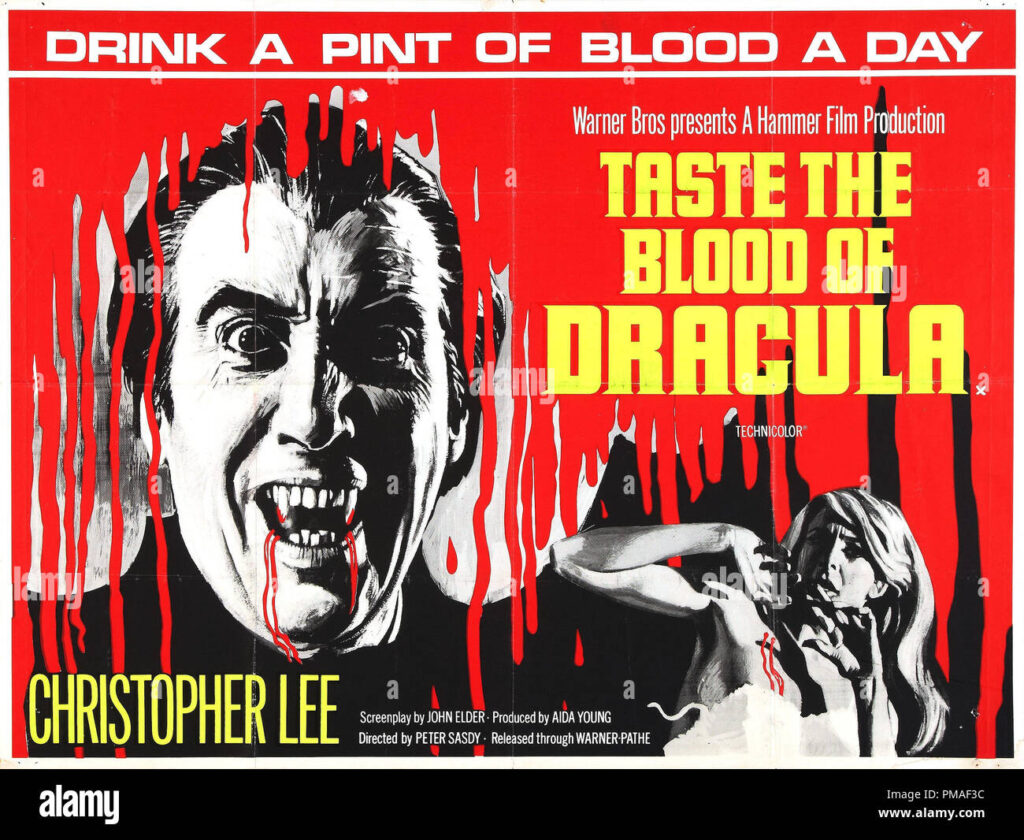
Christopher Lee had grown to detest The Count. He’d done Dracula Prince of Darkness and Dracula has Risen from the Grave as well as the original. He’d only been dragged back for the last one because of the sob story the producers had given him. He was more hopelessly typecast than Bella Lugosi and he knew it. However, he also knew how much money his Dracula movies made in America, and Lee was a working actor. He told Hammer if they wanted him back again, he was going to be getting a raise and a percent of the gross from the US distribution.
It was suddenly decided that as part of its refurbishing plan, Hammer needed a modern Dracula for a modern audience. Ralph Bates had no trouble at all being menacing, he was well-known in Britain, it seemed like a good fit.
The movie starts off with Dracula’s death scene in the previous movie, This time from the POV of a passing drover. The Count’s send-off had been quite a bit gorier than usual. It was the one where Lee was impaled on a cross. The drover decides that when un-life gives you lemons you make lemonade, and collected the Blood of Dracula in order to sell it.
By 1970 the Victorians were all dead, so it was finally safe to rebel against them. The tired-as-hell trope of the pillars of 19th-century society being secret perverts wasn’t quite as played out in the 1970s as it is now, or at least seeing it on screen with bare naked boobs was something new enough.
So three upstanding and utterly hypocritical Victorian gentlemen, (one of them played by M from the James Bond movies) get together for some debauchery at their favorite whore house, run by a flaming cabaret act of a host. There they meet Lord Courtley (Ralph Bates) who is clearly an Aleister Crowley figure. He comes up with the fun idea of them all drinking the dehydrated blood of Dracula that he got from the Drover (and that they paid for), as part of a Satanic ritual. However, at the last second, they break the pact and Courtley ends up being the only one to drink it. He collapses to the ground in a dead heap and they run off.
At this point, Ralph Bates was supposed to rise as Dracula and seek revenge on the men who had abandoned him. I honestly think it might have worked.
Problem, Hammer tried to sneak this one past their new distributor Warner Brothers, informing them very late in the production that Ralph Bates was the new Prince of Darkness. Warner tapped meaningfully on the part of their contract stipulating that Christopher Lee and only Christopher Lee was to play Dracula.
The producers made a pilgrimage to the Lee house to drop another sob story. The rest of the film was reshot with Lee as Dracula rising from the ashes both literal and figurative of Ralph Bates. The last minute reshoot went about as well as it always does. The Count had no reason to be upset with the three perverts but had to act like he did. It was the weakest of the Dracula movies thus far, (there was much worse to come).
It was released as part of a double feature with…
The Horror of Frankenstein
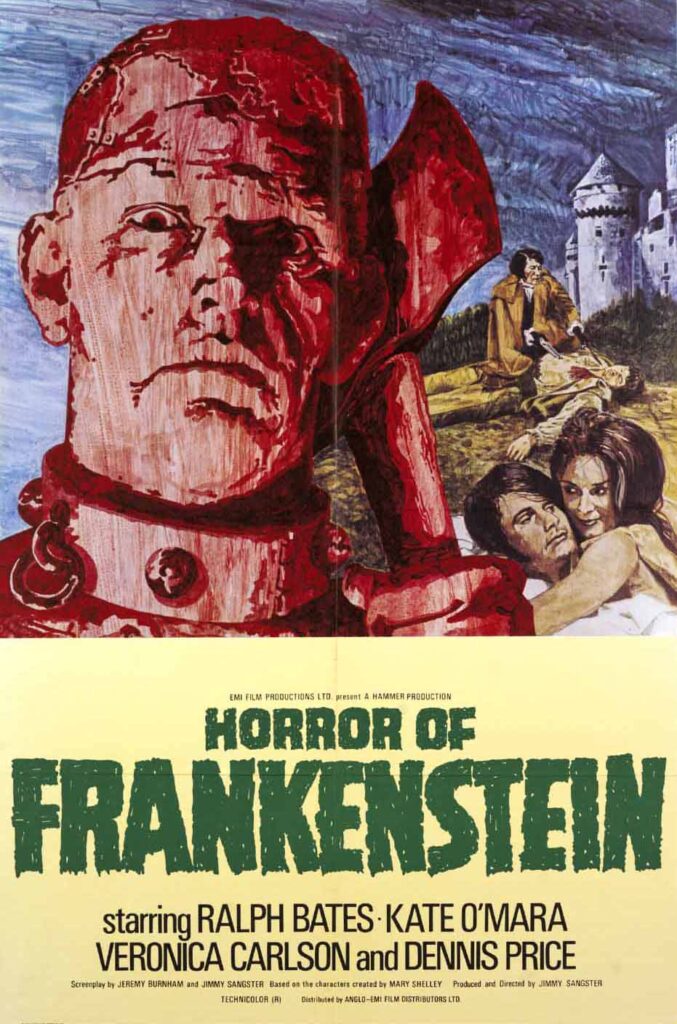
This is a very straightforward remake of the first Frankenstein movie with Ralph Bates taking Cushing’s place as The Good Doctor. It’s meant to play as a black comedy but doesn’t quite land the laughs. It follows the plot of the original with a few minor changes. Frankenstein murders his father so he can go to med school. There he knocks up the dean’s daughter and has to high tail it back to his homeland where he starts work on his Flesh Golem. This time the monster is played by a completely silent David Prowse.
The Monster goes on a rampage, and you know the rest.
Doctor Jekyll and Sister Hyde.
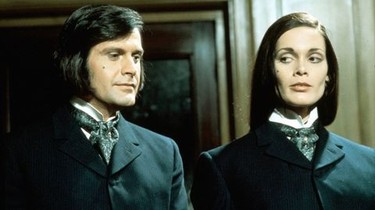
It was an extremely modern take on the old Robert Louis Stephenson novella. Clearly a movie ahead of its time.
This film more than any other was Hammer’s Indian Summer before winter set in. It was the last film to recapture the studio’s gothic magic.
Henry Jekyll is extremely dedicated to sciencing the hell out of whatever, so much so that he has no social life and is very repressed. A friend of his comments that at the rate he was going, he’d die before he finished his work.
Jekyll decides the fellow is right and pauses his research to develop an elixir of life, made from the glands of recently deceased women. Because women live longer. He employs the legendary resurrectionist traders Burke and Hare to supply the goods.
Jekyll meets a girl from the rooms upstairs who takes a shine to a single doctor in Victorian London. She invites him to dinner with her and her mother. Entirely respectable.
Jekyll, whose spiritual descendants would one day work at the CDC, figures he can skip animal trials and jump straight to human experimentation. He glugs it down, staggers around his apartment, and in a fairly clever bit of camera work turns from Doctor Jekyll to Mrs Hyde in one continuous shot. It’s obvious how they did it but it was still elegantly accomplished.
Martine Beswick is now the lead. Yes, there was nudity but it’s one of those rare instances where it’s justified. It wasn’t crass. The picture was itself rated PG.
She/her turns back into a he/him. Clearly, he’ll need more woman juice for his elixir that would have given he/him a monopoly on the 21st pharmaceutical industry.
Sadly, Burke and Hare have had a critical public relations failure and been canceled, in Victorian London. Which is another way of saying Burke was lynched and Hare thrown face-first into a lime pit, permanently blinding him. The famous partnership is out of business.
Jekyll has an additional problem. Dead girls don’t work as well as farm fresh. So he goes hunting for them. Why yes, he does do that in White Chapel. How did you know?
There is also the usual conflict with himself. Mrs Hyde wants to move in permanently and Jekyll is finally starting to feel this whole life prolongation thing just isn’t worth the strain. He wants to quit juicing. Mrs Hyde has gone so far as to seduce and murder a man who was looking into her affairs.
The now blind Hare overhears something and knows that the Ripper is Jekyll. He snitches him out just as Mrs. Hyde decides that the problem with her potion is the quality of the girls available in White Chapel. She decides she needs the pure and innocent girl from upstairs. Before she can collect, the mob catches up with he/she/them. Mrs. Hyde takes to the roofs, falls off a ledge, and dies as an amalgamated non-binary abomination.
This one got… I can’t believe this… Good reviews
“The overall tone remains refreshingly straight. Ralph Bates is infinitely better at being Henry Jekyll than he was at being Baron Frankenstein, and the transformation sequences are stunning, with Bates appearing momentarily emasculated before being transformed into his seductive alter ego, Martine Beswick. Obviously the production suffers from the old Hammer problems of low budget and short schedule, but Baker and his cameraman Norman Warwick have done a lot to make the film visually attractive, and this goes some way towards compensating for the deficiencies of the script. … Admittedly, the conception is sacrificed to the usual formula, and it is Jekyll not Hyde who is hunted down in rather routine fashion by the authorities. But the film remains a welcome reminder that Hammer can still be highly enterprising myth-makers.”
“In the hands of most filmmakers of the time, such a gender-bending theme would call for maximum exploitation tactics, but not with Hammer. Clemens’ script doesn’t take itself too seriously, yet justly fuses the legends of Stevenson’s titular character with Jack the Ripper and the graverobbers Burke and Hare”. Reis commended the film’s performances and Baker’s direction.”
“Director Roy Ward Baker has set a good pace, built tension nicely and played it straight so that all seems credible. He tops chills and gruesome murders with quite a lot of subtle fun. Bates and Beswick, strong, attractive personalities, bear a strange resemblance to each other making the transitions entirely believable.”
It’s almost as if the critics knew it was the end of an era, and that Hammer wouldn’t be able to make something like this again.

